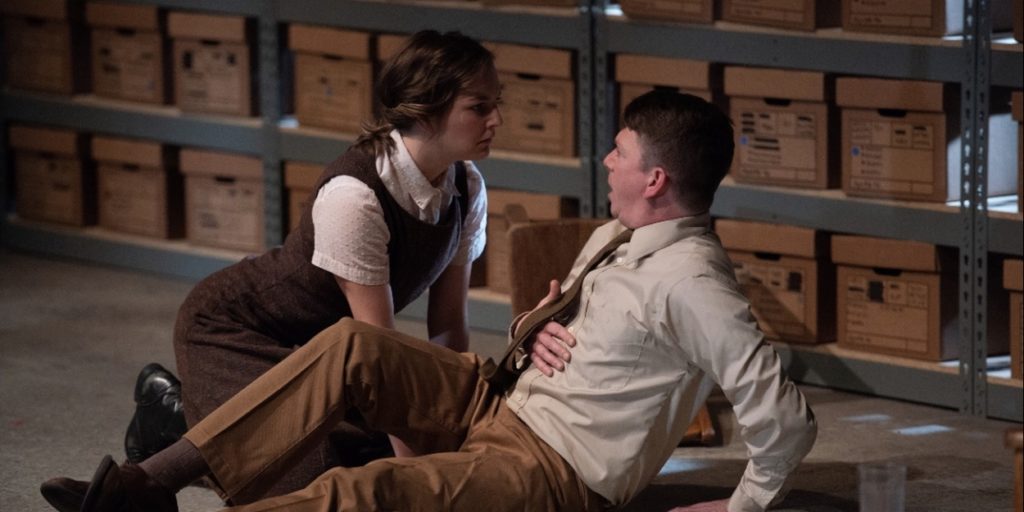Isaac asks: “If we both describe the same thing at the same time will one of our descriptions be more true than the other?”

Put on your thinking cap if you’re thinking of going to see DESCRIBE THE NIGHT. Outrageous circumstances set up this story. Years go by, dire situations accrue – out of order and back and forth – between 1920 to 2010. Characters describe versions of what happened at various times. And although time-frames are briefly shown below the Wilma stage and the time-frame is listed in the program, it’s very challenging to keep straight what happens and in what order.
Not only can jumps in time be difficult to follow, but when real times and not-real times are mixed together, what you have is a made-up, mashed up and convoluted story. As we attempt to grasp the connection between a writer’s diary from the 20s and the characters who come to possess it, we are gasping for air, drowning in Eastern European angst, wishing for less impenetrable mystery and more clarity.
Characters may tell the truth or not, and they try to unravel whether others are lying. During the Russian Civil War, a dissident, Isaac (Ross Bechler), puts his poetic journal into the wrong hands, the hands of his friend, Stalin’s Bulldog and super-cop, Nikolai (Steven Rishard). At one point Nikolai will be capable of a kindness. Does this make him less of a monster?
The set operates at two levels. On ground level is Bureau 42 for Soviet Union History, a large, bare space, a bland place where torture happens. It’s bordered by boxes upon boxes of evidence files, a depository for the “truth,” which has been twisted to fit the needs of the regime. On the upper proscenium stage a beautifully designed and lighted forest of dreamy tree trunks sets a very different mood. Matt Saunders’ set design and Thom Weaver’s lighting tricks, mixing normal and uber-lighting, add much to the production, as does Christopher Colucci’s tone-perfect original music and sound design. And while there might be a tad of over-acting from some quarters, some of it is cleverly deliberate: A witch-mother, all in black, practically steals the show with her gross leech soup that requires human blood. Yum. That scene has humorous elements, and the play has other, more cerebral, humorous moments as well, but don’t think this is some kind of comedy – it’s not.
One very smart choice was to have the actors speak English without attempting Russian and Polish accents. That could really bomb. I don’t know if it was playwright Rajiv Joseph’s idea or Blanka Zizka’s. But it adds a layer of theatricality and reality to have the play spoken in our vernacular.
Years are presented out of sequence. Continuous back-and-forth mixes any truth with fiction: The invasion of Poland, Stalin, murders, the Berlin Wall-fall, the transition from Soviet. [Isaac Babel, a real person, disappeared in 1938, a victim of Stalin’s purges.] Much is made of Stalin’s bloodthirsty paranoia and the all-pervasive influences of his murderous regime, which would be of particular interest to Blanka Zizka who, with her husband Jiri, escaped from communist Czechoslovakia. This work is complicated. They’re not fooling around. It’s not an easy play.
[Wilma Theater, 265 S. Broad Street] January 26-February 16, 2020; wilmatheater.org
Seating note: It was surprising to encounter a completely new approach to audience seating. The old seats are not there. For the lucky few who were seated traditionally, straight forward to the stage area, it was a good view. For many others, like myself, the view wasn’t so good. We were seated high up along the side edges, behind a black horizontal pole that extended right across the line of vision. It blocked out actors’ faces. If people in our row leaned forward to see past the pole, it would block the view of the person next to them. Bad sightlines made the story harder to follow.

Interesting review. I think I will pass on this play.